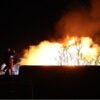The PRC announced this past week that the People’s Liberation Army (PLA) budget would increase by about 7.5% in 2010. This marks the first time that the PLA budget has had an increase of less than 10% in nearly a decade. But don’t jump the gun. It is far from clear that it represents anything with implications for China’s long-term challenge to US predominance in the Asia Pacific.
Chinese defense spending figures are notoriously unreliable, important more for the political signals they send than actual spending. The scale of the announcement, roughly halving the rate of increase for this year’s defense budget compared with last year, is perhaps no more than a signal the Chinese government will be spending noticeably less on specific defense-related projects than it has in previous years.
Consistent with this possibility are two other recent announcements. One is that the launch of the Tiangong-1 (Heavenly Palace) spacelab would be delayed from 2010 to 2011. While this might be due to technical difficulties, it might also reflect a scarcity in resources sufficient to impinge upon the high visibility (and high prestige) manned space program. Furthermore, the PRC also announced the passage of a national defense mobilization law. This much delayed piece of legislation, several years in the making, will allow the PLA to legally draw upon the resources of the larger civilian economy in event of crisis. In combination, these various developments could suggest that the PLA is being asked to make trade offs, including curtailment of highly visible programs, and be prepared to draw more upon the civilian economy.
Certainly, worth noting, but hardly a sea change. If China’s defense spending growth is slowing, it’s still increasing.
The implications are uncertain; so is the motivation. On the one hand, it may be a domestic political move. There is apparent concern about the need to increase social spending to bridge the growing gap between rich and poor—and defense spending may be where it comes from. Alternatively, it may be that the Chinese economy has slowed so appreciably, it requires belt-tightening even in the Ministry of Defense.
Whatever the Chinese tea leaves may say, it is important to keep in mind that a reduced rate of growth for one year does not equate with cut-backs. It remains to be seen whether the PLA will actually turn inward in the coming year, or whether it will continue to expand its areas of operations and improve its array of equipment.






























